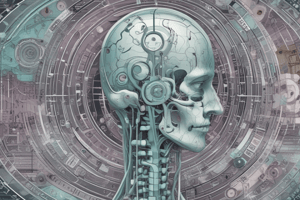Podcast
Questions and Answers
Knowledge involves synthesizing information to identify and formalize interrelationships.
Knowledge involves synthesizing information to identify and formalize interrelationships.
True (A)
Nursing Practice is solely based on raw data without any synthesis or interpretation.
Nursing Practice is solely based on raw data without any synthesis or interpretation.
False (B)
Principles of Nursing Informatics do not involve the integration of data, information, and knowledge in nursing practices.
Principles of Nursing Informatics do not involve the integration of data, information, and knowledge in nursing practices.
False (B)
A nurse may plan actions based on demographic data, circulatory system information, and pharmacokinetics.
A nurse may plan actions based on demographic data, circulatory system information, and pharmacokinetics.
In the example provided, the patient's hypotension was not due to blood loss.
In the example provided, the patient's hypotension was not due to blood loss.
Nursing Practice involves making final decisions that guide patient care based only on theoretical knowledge.
Nursing Practice involves making final decisions that guide patient care based only on theoretical knowledge.
Using computer systems can decrease patient care quality, safety, and consistency.
Using computer systems can decrease patient care quality, safety, and consistency.
Nursing informatics can create protocols to ensure proper communication between departments, teams, individuals, and patients.
Nursing informatics can create protocols to ensure proper communication between departments, teams, individuals, and patients.
Clinical information from different disciplines cannot be viewed and analyzed by nursing staff using nursing informatics.
Clinical information from different disciplines cannot be viewed and analyzed by nursing staff using nursing informatics.
Entering patient vital signs, admission, nursing assessments, care plan, and nursing notes into the system is not part of patient charting.
Entering patient vital signs, admission, nursing assessments, care plan, and nursing notes into the system is not part of patient charting.
Care planning time is increased due to the use of nursing informatics.
Care planning time is increased due to the use of nursing informatics.
More time becomes available for client care when less time is required for documenting physician orders.
More time becomes available for client care when less time is required for documenting physician orders.
Electronically prescribed drugs are less legible compared to handwritten prescriptions.
Electronically prescribed drugs are less legible compared to handwritten prescriptions.
Electronically stored client records provide quick access to clinical data for a large number of clients.
Electronically stored client records provide quick access to clinical data for a large number of clients.
Tele-nursing involves in-person services such as hands-on care.
Tele-nursing involves in-person services such as hands-on care.
Automated nursing care plans help in delivering standardized care and improving outcomes.
Automated nursing care plans help in delivering standardized care and improving outcomes.
Extensive financial information cannot be collected or analyzed through information systems.
Extensive financial information cannot be collected or analyzed through information systems.
Research and Evidence Collection is not a benefit of using electronic systems in nursing.
Research and Evidence Collection is not a benefit of using electronic systems in nursing.
Nursing informatics can only be applied to clinical practice.
Nursing informatics can only be applied to clinical practice.
Nursing informatics involves only computer skills like conducting computerized searches.
Nursing informatics involves only computer skills like conducting computerized searches.
One of the applications of Nursing Informatics is in research for data gathering.
One of the applications of Nursing Informatics is in research for data gathering.
Computer technology in hospitals cannot assist in the planning of recommended interventions for patients.
Computer technology in hospitals cannot assist in the planning of recommended interventions for patients.
Nursing informatics does not involve the interpretation of information flow within the organization.
Nursing informatics does not involve the interpretation of information flow within the organization.
One of the uses of computers in hospitals is to help healthcare employees retrieve and review patient records for discharge planning.
One of the uses of computers in hospitals is to help healthcare employees retrieve and review patient records for discharge planning.
Assessment, patient monitoring, documentation, and telemedicine are some uses of computers in clinical implementation.
Assessment, patient monitoring, documentation, and telemedicine are some uses of computers in clinical implementation.
One of the obstacles facing practicing nurses in moving forward with nursing informatics is the high number of nursing staff.
One of the obstacles facing practicing nurses in moving forward with nursing informatics is the high number of nursing staff.
Nurses are often decision-makers when it comes to choosing information systems for their practice.
Nurses are often decision-makers when it comes to choosing information systems for their practice.
One of the barriers to nursing informatics is nurses being constrained by a lack of IT skills.
One of the barriers to nursing informatics is nurses being constrained by a lack of IT skills.
Insufficient database necessary to answer workforce nursing questions is not a barrier to nursing informatics.
Insufficient database necessary to answer workforce nursing questions is not a barrier to nursing informatics.
Study Notes
Nursing Informatics
- Integrates nursing science, computer science, and information science to manage and communicate data, information, and knowledge in nursing practices.
- Facilitates the integration of data, information, and knowledge to support patients, nurses, and other providers in their decision-making.
- Applications of information science promote the health of populations, communities, families, and individuals.
- Protections of personal health information as a critical issue in the context of rapidly evolving health information technologies.
Benefits of Nursing Informatics
- Computer systems increase patient care quality, safety, and consistency through quick, easy access to patient's clinical information.
- Enhancing end-to-end treatment and continuity of care by creating protocols to ensure proper communications and interactions between departments, teams, individuals, and patients.
- Patient charting: vital signs, admission and nursing assessments, care plan, and nursing notes can be entered into the system.
- Clinical data integration: clinical information from all disciplines can be viewed and analyzed by nursing staff and then integrated into a patient's care plan.
- Decreased data entry: e.g., allergies and vital signs need only be entered once.
- Better care planning: time spent on care planning is reduced, while the quality of what is recorded is improved.
- Increased time for client care: more time is available for client care because less time is required for documentation of physician orders.
- Better drug administration: electronically prescribed drugs are more legible, thus making it less likely that drugs would be wrongly administered to patients and decreasing potential for error.
Additional Benefits
- Facilitation of data collection for research.
- Creation of a lifetime clinical record.
- Privacy, confidentiality, and security of health information.
- Tele-nursing: remotely provides services such as education, monitoring, and counseling that increase patient satisfaction and influence self-care behavior.
- Research and evidence collection: searching and collecting evidence for best nursing care practices.
- Automated nursing care plans and work lists that remind nurses of planned interventions lead to standardized care and improved outcomes.
- Extensive financial information: can be collected and analyzed for trends.
Skills Required for Nursing Informatics
- Computer skills: contain computerized searches and retrieving patient demographics data, the use of telecommunication devices, the documentation of patient care, and the use of information technologies for improving nursing care.
- Informatics knowledge: recognition of the use or importance of nursing data for improving practice.
- Informatics skills: includes the interpretation of information flow within the organization, the preparation of process information flow charts for all aspects of clinical systems, and the development of standards and database structures to facilitate clinical care, education, administration, or research.
Application of Nursing Informatics
- Clinical practice: computer-generated client documentation, electronic medical record (EMR), and computer-based patient record (CPR).
- Administration: defining the cost of nursing services, evaluating quality assurance and outcomes analysis, and demonstrating the cost-effectiveness of hospitals.
- Education: computerized-assisted instruction, interactive video technology, distance learning-web-based courses, and degree programs.
- Research: data gathering, computer-assisted interactive instructions, and tutorials for learning.
Obstacles/Barriers Facing Practicing Nurses
- Low number of nursing staff.
- Unavailability of computer infrastructure for financial reasons.
- Minimal sets of technology to implement nursing informatics.
- User acceptance.
- Nurses are constrained by lack of IT skills.
- Nurses are not familiar with using a password.
- Unavailability of informatics in service and staff development training programs.
- Nurses are often not a decision-maker when information systems are chosen.
- Insufficient database necessary to answer the work force nursing question.
- Organizational strategic plan.
Studying That Suits You
Use AI to generate personalized quizzes and flashcards to suit your learning preferences.
Description
Test your ability to interpret medical data with scenarios like a 45-year-old male patient post cardiac surgery experiencing hypotension with specific blood pressure and chest tube drainage measurements.




